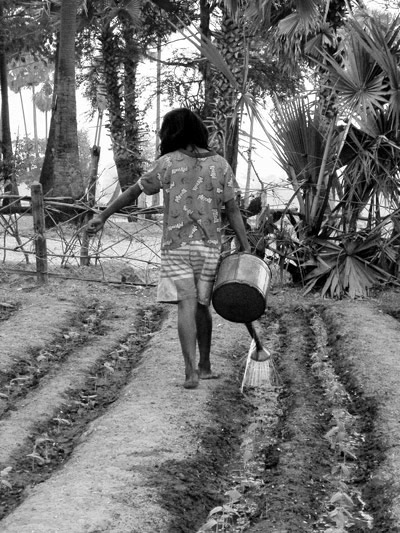Khuon Sey, So Sophal and Sam Kanha are among the small-scale women farmer leaders in Cambodia and members of a national coalition of farmers, the Farmer and Nature Net (FNN). Khuon hails from the Pursat province, 302 kilometers north of Phnom Penh while So lives in Kandal, in the outskirts of the capital Phnom Penh. Sam, the president of FNN’s Rural Women Network comes from Svay Rieng in the southern part of the province.
 Although these women have the capacity to produce their own food and organise their own communities, they were not spared from the wrath of the food crisis.
Although these women have the capacity to produce their own food and organise their own communities, they were not spared from the wrath of the food crisis.
While these women grow organic rice and other crops in their own farms, their produce remains inadequate for their own families’ consumption. During some months of the year, they would have to purchase rice and vegetables from the market.
But the price fluctuation during the food crisis was too abrupt, that the cost of basic commodities could rise nearly a 100 per cent in just a short period. Rice, for instance, rose from KHR65,000 to 75,000 (US$16 to 18.50) per 50 kilograms to KHR115,000 (US$28) per 50 kg. The women were likewise concerned about the implications of consuming chemically-treated vegetables as they feel that such produce are likely to induce skin allergies, liver cancer, respiratory diseases, and even fetal disorder.
Bann Danh Kaksikor Noeng Thomacheat (Borkortor)
(English name: Farmer and Nature Net (FNN))
Borkortor links local farmer associations in Cambodia with international groups to further promote farmers’ rights and interest and an ecological agriculture movement. It facilitates dialogues and partnerships among various stakeholders within villages. Its key programmes include the formation of local associations of farmers and the latter’s development into village clusters. Borkortor also provides capacity-building activities for these associations.
Sources: Asian Farmers Association and Agro-Info.net
As their incomes remain unchanged, the women tend to buy less of other needs. But as budget realignments still fall short, some women in their communities have decided to migrate to richer neighbouring countries like Thailand and Vietnam and work as garment factory workers or even as farm workers. Some parents have also discontinued the schooling of their children as the latter were sent to work to nearby farms. But there are some women who could not cope with the crisis that they turned to increased drinking, abandoning their roles and responsibilities.
At the moment, Khuon, So and Sam are leading their communities in collective savings and in accessing trainings on health, sanitation, family-budgeting and agricultural techniques from both government and non- government sectors.
More than ever, organising communities, especially women’s farmers have become an important strategy towards a clearer understanding of the issues surrounding them; enhanced knowledge and capacities; and stronger solidarity. But for Khoun, So and Sam, undertaking much of these tasks begins with making men understand women by further providing gender-sensitivity among husbands, leaders of farmer organisations, and other members of the communities.





 The
The 
 Isis Resource Center holds one of the largest feminist collections of materials in the Global South. With 40 years of publication experience, Isis holds a vast collection.
Isis Resource Center holds one of the largest feminist collections of materials in the Global South. With 40 years of publication experience, Isis holds a vast collection.